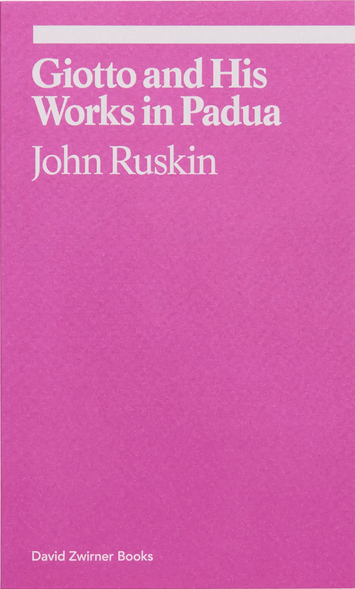
Giotto and his Works in Padua
Paginas
184Formato
PaperbackFecha de lanzamiento
2018Editora
David Zwirner BooksPeso
2.5 ozTamaño
4 ¼ x 7 in | 10.8 x 17.8 cmEdición
ISBN: 9781941701799The Arena Chapel in Padua was completed in 1303; Giotto, then considered the preeminent painter in Italy, was commissioned to paint it in 1306. The resulting fresco cycle, detailing the history, birth, life, and death of Christ, ranks among the greatest artworks ever created.
John Ruskin helped redefine art criticism in the nineteenth century through his attention to detail, his playful and engaging prose, and the conviction with which he discussed the subjects that mattered most to him. Ruskin’s ekphrastic writing became a way for readers to approach the experience of looking at great art without actually seeing it in person. Despite having written about Giotto on numerous occasions in Stones of Venice and Modern Painters, he never treated the Arena Chapel in its own right. Here Ruskin examines the panels and brings them life, describing their many hidden details, all the result of Giotto’s unrivaled genius. As Ruskin says, “Giotto was…one of the greatest men who ever lived.”
Long out of print, the Arundel Society first published Giotto and His Works in Padua between 1853 and 1860. It stands as Ruskin’s most compelling set of reflections on Giotto’s masterpiece—an artwork that, in Ruskin’s estimation, changed the very course of art history. Originally accompanied by a set of black and white woodcuts of the panels in the Chapel, this new edition presents each panel in vivid color photography, adding a useful visual aid to Ruskin’s lyrical descriptions. The result is a book that serves not only as an introduction for students of art history, but also as a discussion of what it means to be a great artist, by one of most influential writers ever to tackle visual art.
John Ruskin
John Ruskin (1819–1900) was an English critic of art, architecture, and society, who sought change through his polemical prose. Best know for his five-volume treatise on art, Modern Painters—published volume by volume from 1843 to 1860 – Ruskin applied Romantic thought to art criticism, rather than relying solely on religious tradition. In doing so, he opened up possibilities surrounding the appreciation and understanding of art, through emotive descriptions, rather than illustration. Particularly intrigued by the painting of the Gothic Middle Ages, Ruskin felt that painters such as Giotto and Fra Angelico were the ideal subject for modern painters. Ruskin’s then novel insistence that art and architecture are the direct expression of the conditions in which they were made, continues to influence the study of the fields today.
Robert Hewison
Robert Hewison is a British cultural historian who has combined a life-long study of John Ruskin with an active engagement in contemporary culture. He became interested in Ruskin when he wrote a television adaptation of the Whistler v. Ruskin libel trial, and returned to Oxford to take a research degree that led to his first book, John Ruskin: The Argument of the Eye (1976). In 1978 he curated Ruskin and Venice at the J.B. Speed Art Museum, Louisville. He has edited two collections of essays on Ruskin, New Approaches to Ruskin (1981, reprinted 2015) and Ruskin’s Artists: Studies in the Victorian Visual Economy (2000). In 2000 he co-curated Ruskin, Turner and the Pre-Raphaelites at Tate Britain and in 2009 published Ruskin on Venice: “The Paradise of Cities”. In addition to a career as theatre critic, arts journalist and broadcaster, he has held chairs at Lancaster University and City University London, and was Slade Professor of Fine Art at Oxford in 2000. In 2017 he delivered a course on Ruskin for the Graduate School of Architecture, Planning and Preservation at Columbia University, New York.



